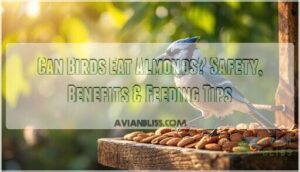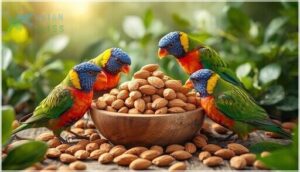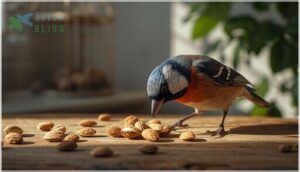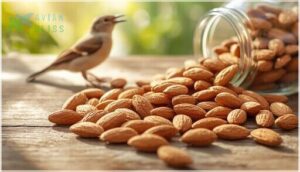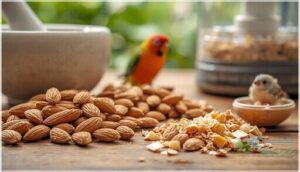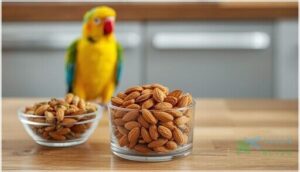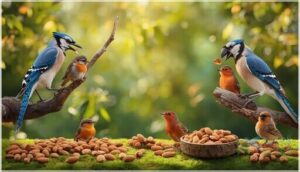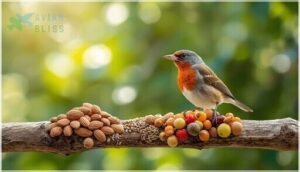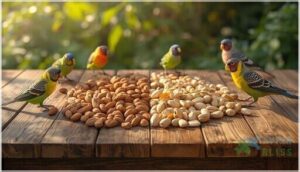This site is supported by our readers. We may earn a commission, at no cost to you, if you purchase through links.
You’ve just watched a blue jay land on your feeder, and you’re wondering if those almonds in your pantry might make a good treat. The short answer: yes, birds can eat almonds, but preparation matters more than you’d think. Raw, unsalted almonds offer protein, healthy fats, and essential minerals that support feather health and energy levels.
However, whole almonds pose choking risks for smaller birds, and bitter almonds contain toxic compounds that can be fatal. The difference between a nutritious snack and a potential hazard often comes down to proper sizing, avoiding certain varieties, and understanding which species benefit most from this calorie-dense food.
Table Of Contents
Key Takeaways
- Birds can safely eat raw, unsalted almonds if they’re chopped or crushed to prevent choking, especially for smaller species.
- Bitter almonds are toxic to birds due to cyanide-producing compounds and should always be avoided.
- Almonds offer protein, healthy fats, and key vitamins, but should only be fed as occasional treats to prevent obesity and nutritional imbalance.
- Moldy, salted, or flavored almonds, as well as almond shells, pose serious health risks and must not be given to birds.
Can Birds Eat Almonds Safely?
Yes, birds can eat almonds, but not all almonds are created equal. You’ll want to know which types are safe and which can harm your feathered friends.
Let’s look at what you need to think about before offering almonds to birds.
Which Almonds Are Safe for Birds
When you’re choosing almonds safe for your bird, raw unsalted almonds are your best option. Avoid roasted varieties with added ingredients like salt, sugar, or flavorings—these can harm your feathered friend.
Safe almond preparation for birds means finely chopping or crushing them to prevent choking. Remove shells for smaller species. Addressing such issues can be important as parenting styles matter in shaping individual experiences.
Most importantly, steer clear of bitter almonds entirely; they contain dangerous compounds we’ll discuss next.
Why Bitter Almonds Are Dangerous
Bitter almonds contain amygdalin, which releases cyanide when your bird digests them—a toxic substance that can cause lethargy, vomiting, and respiratory distress even in small amounts. Avian sensitivity to cyanide exposure means just a few milligrams per kilogram can be dangerous. Systematic reviews can help determine the extent of such dangers.
Precautionary measures to protect your bird:
- Never offer bitter almonds or products with bitter almond flavoring
- Stick to sweet almonds—they’re almonds safe for birds
- Watch for unusual behavior after introducing any new food
- Commercial bitter almond extracts aren’t safe flavorings for pets
- When in doubt, consult your avian veterinarian about toxic nuts for birds
Almonds Vs. Other Nut Options
When comparing almonds to other nuts, you’ll notice walnuts pack nearly 13% more calories and higher omega-3 content—654 versus 579 calories per 100g—while almonds deliver 39% more protein.
Hazelnuts and pecans offer similar healthy fats with additional antioxidants. Cashews work well but watch their fat levels. Macadamia nuts are safe too.
Rotating your nut variety prevents nutritional gaps and keeps your bird interested.
Nutritional Benefits of Almonds for Birds
Almonds pack a nutritional punch that can support your bird’s health in several meaningful ways. They contain a balanced mix of macronutrients and micronutrients that address specific dietary needs for many species.
Here’s what almonds bring to your bird’s food bowl.
Protein and Healthy Fats
Almonds deliver about 21% protein by weight, helping your bird build strong muscles and maintain healthy feathers. They’re especially valuable for their fatty acids:
- Monounsaturated fats make up roughly 50–55% of the kernel, supporting energy-dense diets when portioned carefully
- Linoleic acid promotes skin and feather health in species that digest nuts well
- Energy contribution reaches 5–6 calories per gram, so moderation matters
Balance almonds with other protein sources for complete nutritional value.
Essential Vitamins and Minerals
Your bird’s feather quality and immune support depend on the vitamins and minerals packed in these kernels. Almonds offer vitamin E (tocopherols) for antioxidant defense, plus B-complex vitamins that aid energy metabolism. They also contain magnesium and selenium, promoting nerve function. However, their calcium-to-phosphorus ratio isn’t ideal for bone health, so you’ll need to balance almonds with other nutrients in your bird’s diet.
| Nutrient | Role in Bird Health | Recommendation |
|---|---|---|
| Vitamin E | Promotes feather quality and antioxidant function | Moderate amounts beneficial |
| B-Complex | Aids energy metabolism and nerve health | Present in useful quantities |
| Magnesium | Enzyme function and muscle health | Low-to-moderate levels present |
| Calcium/Phosphorus | Bone health and mineral balance | Requires dietary variety for balance |
Almonds as an Energy Source
When you’re supporting your bird’s daily activity, almonds pack roughly 579 kcal per 100 grams—impressive caloric density that fuels flight and thermoregulation. Their fatty acids and protein content address energy needs, though bird metabolism varies by species.
Consider these nutritional value highlights:
- High-fat profile (49 g per 100 g) supplies concentrated energy
- Protein content (21 g per 100 g) aids tissue repair
- Carbohydrates (22 g per 100 g) influence glycemic response
- Nutrients must fit within total daily calorie budgets
- Almonds supplement—not replace—formulated diets for birds as an energy source
Risks of Feeding Almonds to Birds
Almonds offer real nutritional value for birds, but they’re not without their downsides. From choking risks to health issues tied to overfeeding, there are several concerns you’ll want to understand before adding almonds to your bird’s diet.
Let’s look at the main risks and how to spot them early.
Choking Hazards and Safe Sizes
A single whole almond can block a small bird’s airway in seconds. To protect your feathered friend, you need to prepare almonds correctly before offering them.
| Bird Size | Maximum Safe Piece Size | Preparation Method |
|---|---|---|
| Small (finches, canaries) | Under 0.5 cm | Finely chopped or ground |
| Medium (cockatiels, conures) | Under 1 cm | Chopped into small bits |
| Large (macaws, cockatoos) | 1–1.5 cm | Chopped or halved |
| Wild backyard birds | Crushed or ground | Scattered in small amounts |
Always supervise feeding sessions and introduce almonds gradually. Remove uneaten pieces after 10–15 minutes to prevent spoilage. Species variation matters—what’s safe for a parrot might choke a finch.
Obesity and Overfeeding
Too much of a good thing can tip the scales—literally. When almonds exceed 10% of your bird’s daily intake, weight gain averages 0.3–0.6 grams weekly in wild birds. Here’s why portion control matters:
- Calorie surplus: Almonds pack 5.5–6.5 kcal per gram, rapidly exceeding maintenance needs
- Dietary fat overload: At 50–55% fat content, they raise intake beyond healthy ranges
- Obesity risks: Regular overfeeding correlates with obesity-related conditions in captive parrots
Energy density demands moderation.
Allergic Reactions and Sensitivities
Though rare, nut sensitivities can strike individual birds with surprising intensity. Allergy symptoms—itching, swelling, respiratory distress—mimic other conditions, complicating diagnosis without careful tracking.
Species variation matters: parrots show higher sensitivity than many songbirds, and cross-reactivity with related Prunus fruits occurs.
Start with tiny test portions, log any reactions, and contact your avian vet if you notice sudden appetite changes or facial swelling.
Goitrogenic Compounds and Health Concerns
Almonds contain goitrogenic compounds that might affect thyroid function—but hold on before you panic. At typical pet bird portions, thyroid disruption risk stays minimal. Species variability plays a role: parrots respond differently than finches, and goitrogen thresholds haven’t been standardized across birds.
Commercial diets avoid concentrated goitrogens, reducing cumulative health risks. Unlike bitter almonds harboring toxic cyanide, sweet varieties pose negligible danger when fed moderately within balanced diet composition.
How to Prepare Almonds for Birds
Getting almonds ready for your bird isn’t complicated, but a few simple steps can make all the difference between a safe treat and a potential problem.
The right preparation protects your bird from choking, keeps harmful substances out of their diet, and ensures they’re getting fresh, quality nutrition.
Here’s what you need to know before offering almonds to your feathered friend.
Choosing Raw, Unsalted Almonds
When you’re picking almonds for your feathered friends, freshness indicators matter—look for firm, unshriveled kernels with a mild, sweet aroma. Raw almonds offer greater nutritional benefits compared to roasted varieties, and unsalted almonds guarantee safety by preventing sodium-related health issues.
Store your selection in airtight containers in cool, dry places to maintain quality. Consider variety selection from reputable suppliers to guarantee mold-free products suitable for feeding birds almonds responsibly.
Chopping and Crushing for Safety
Once you’ve selected quality raw almonds, proper particle size becomes your next safety priority. Crushing methods like a mortar and pestle or food processor work well—aim for finely chopped almond pieces around 6–8 mm to prevent choking hazard in smaller birds. Shell removal is essential before preparation.
Match your crushing technique to bird size, since digestibility concerns increase with larger fragments in a safe bird diet.
Avoiding Mold and Spoilage
After you’ve chopped almonds to the right size, storage practices become your defense against toxic mold. Visual inspection and a smell test can catch early signs of mold growth—discard any almonds showing discoloration or musty odors.
Aflatoxins from moldy nuts cause serious liver damage in birds.
Moldy nuts contain aflatoxins that can cause serious liver damage in birds
Freezing almonds extends shelf life and prevents contamination, giving you safer treats long-term.
Which Birds Can Eat Almonds?
Not all birds handle almonds the same way. Some species can crack and digest them easily, while others may struggle or face health risks.
Let’s look at which birds can safely enjoy almonds and which ones you should keep away from this snack.
Parrots, Cockatiels, and Pet Birds
You can safely offer almonds to your parrots and cockatiels, but size matters. Chop them into 6–8 mm pieces to prevent choking—smaller pet birds need finely crushed portions. Watch for pet bird allergies like diarrhea during first offerings.
Limit almond treat frequency to 1–2 times weekly, keeping a balanced parrot diet with varied foods. Your cockatiels benefit from the protein, but almonds shouldn’t dominate their parrots diet.
Wild Birds in Your Backyard
Many backyard birds can handle almonds when you prepare them properly, though species preferences vary by region. Observational data shows chickadees, nuthatches, and blue jays may accept chopped pieces, but their natural diets center on native seeds and nuts.
- Chop almonds into 4–6 mm pieces for smaller species
- Inspect feeders weekly to prevent feeder contamination and mold
- Watch which birds actually take the almonds—not all will
- Mix with varied seeds to support safe almond consumption for birds
Regional variations matter when feeding birds almonds in your yard.
Birds to Avoid Feeding Almonds
Small species like budgies, finches, and canaries face serious choking hazards from almonds, even when crushed. Young chicks lack the digestive capacity to handle these high-fat nuts.
Migratory songbirds need their natural diet preserved—don’t disrupt it.
If your bird shows distress after eating almonds or other toxic foods, contact an avian vet immediately for guidance.
How Often Should Birds Eat Almonds?
Almonds shouldn’t be a daily menu item for your bird. Think of them as the occasional cookie, not the main course—they’re nutrient-dense, but too much of a good thing can tip the scales toward weight gain and health issues.
Let’s break down how much, how often, and what warning signs tell you it’s time to pull back.
Recommended Portion Sizes
You’ll want to stay mindful of portion control when adding almonds to your bird’s diet. For small to medium birds, limit your daily almond offering to 5–10 nuts, which equals roughly 1–2% of their caloric intake. Larger parrots can handle 10–15 almonds per day.
Keep the safe almond weight under 5 grams per feeding, and rotate nut portions regularly to prevent overreliance on any single nutrient source.
Treat Frequency and Moderation
Think of almonds as occasional treats—not daily essentials—for your bird’s balanced diet. Feeding guidelines suggest offering almonds 2–3 times a week to avoid disrupting portion control and nutrient balance.
Treat timing matters across bird species; some parrots tolerate more frequent supplements, while smaller finches need stricter supplement frequency.
Space out treats to keep your bird’s diet varied and prevent overreliance on high-fat foods.
Signs of Overconsumption
Weight gain is often your first warning sign that almond treats have become too routine in your bird’s diet. Regular consumption beyond twice weekly can lead to measurable increases in body mass over just six months.
Watch for these signals that your bird is overindulging:
- Feather issues like dullness or loss, often paired with lethargy and reduced activity
- Digestive problems including drooling, loose droppings, or decreased appetite
- Behavioral changes such as reduced vocalization or reluctance to interact
Contact your avian vet if you notice persistent symptoms after almond feeding.
Almond Alternatives and Unsafe Nut Types
Almonds aren’t the only safe option when you’re looking to treat your feathered friends. Some nuts offer similar nutritional benefits, while others pose serious health risks you’ll want to avoid completely.
Let’s look at which alternatives work well and which ones could harm your birds.
Other Safe Nuts for Birds
Beyond almonds, you’ve got several alternative nut options for birds that pack nutritional benefits. Brazil nut size matters—offer tiny fragments to prevent choking. Walnut preparation involves crushing hard shells before serving. Choose shelled, unsalted pistachio types for easier handling. Practice cashew moderation due to high fat content. Sunflower inclusion should stay minimal in their diet. Always select unsalted varieties as safe food for your feathered friends.
Nuts to Avoid (Salted, Bitter, Moldy)
Salted almonds raise sodium levels and stress your bird’s kidneys over time. Bitter almonds contain amygdalin, which releases toxic cyanide when digested. Moldy nuts carry aflatoxin risk—studies show 3–5% of supermarket almonds harbor mold contamination that damages liver tissue.
Store almonds in cool, dry conditions and discard any batch showing off-odors or discoloration within two weeks.
Almond Shells and Processed Almond Products
Almond shells pose fracture and digestive injury risks when swallowed—they’re too hard for your bird’s system. Processed almond dangers include salted almonds and flavored almonds, which disrupt electrolyte balance and strain kidneys.
Watch for these shell ingestion risks and processed almond dangers:
- Hard fragments cause choking and internal injury
- Added salt triggers dehydration
- Oils and flavorings stress organs
- Mycotoxin exposure from contamination
Stick to safe almond diets using raw, shelled varieties only.
Frequently Asked Questions (FAQs)
Can baby birds safely eat crushed almonds?
A nestling clutching its perch offers a snapshot of vulnerability. Baby birds lack the digestive maturity for crushed almonds, which pose choking hazards and esophageal obstruction risks.
Safe alternatives like formulated hand-feeding diets provide better nutritional balance.
Do almonds affect bird egg production or fertility?
No peer-reviewed studies link almond consumption to changes in bird egg production or fertility.
When fed as occasional treats within balanced diets, almonds don’t show consistent effects on reproductive metrics across tested species.
Can almonds help birds during molting season?
During molting, your bird’s body works overtime to shed old feathers and grow new ones.
Almonds provide protein, vitamin E, and healthy fats that support feather regrowth and energy, making them a beneficial molting season treat.
Are almond skins safe for birds to consume?
You can offer almond skins to birds, but pay close attention to Bird Size and Preparation Methods.
Skin Nutrients benefit bird nutrition, yet Toxin Risk rises if mold develops.
For safe bird feeding practices, always confirm freshness and proper handling.
How to store almonds for backyard bird feeding?
Don’t let almonds go stale before their time—store them in airtight containers with UV protection to block moisture and sunlight.
For mold prevention and food safety, refrigerate or freeze almonds, maximizing nutritional benefits for backyard bird feeders.
Conclusion
Like a chef who knows that a pinch too much spice can ruin the dish, your choices matter when asking, can birds eat almonds. Preparation, portion, and variety shape whether almonds nourish or endanger your feathered guests.
Treat almonds as a thoughtful offering, not a casual snack. Birds thrive when you balance curiosity with caution. By respecting their needs and limits, you become more than a feeder—you become a guardian of their health, season after season.

